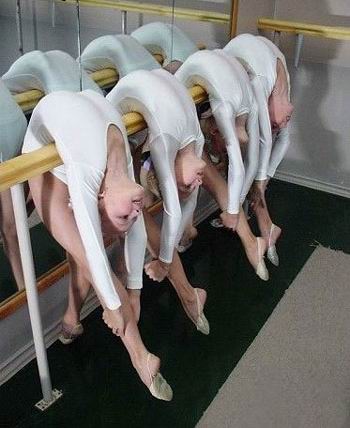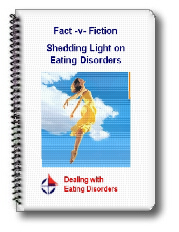|
What are Eating Disorders and athletes?
Hurdles in the Athletic World: Eating Disorders A thin athlete is preferred in certain sports, and this is one reason for the higher rates of eating disorders in these sports. Sports like gymnastics, distance running, distance skiing, swimming, figure skating, dancing, horse racing, rowing, wrestling and cheerleading have staggeringly high rates of eating disorders. Male sports that ranked the highest at risk for eating disorders are wrestling and cross-country running, so, as with all eating disorders, males are not immune. 
Females are more at risk, however, because they face more risk factors then guys. The western culture idolizes thin females, and when that is combined with the pressure to be thin for a sport, the reasons more girls succumb to an eating disorder are apparent. The western appearance for an ideal male is someone with a tall muscular build. Thinness in males is seen as lack of muscle, which is associated with weakness. Therefore males are facing contradicting pressures, whereas the pressure for female athletes can be the same. These pressures can then build on one another. The desire to please coaches and judges also adds to the pressure. Judges that evaluate artistic merit, as is the case for gymnastics, or synchronized swimming, often associate being thin with higher scores. Being thin has become more and more sought after, and in recent decades the average weight for female athletes has dropped significantly. Since an athlete has to tax their body for their sport, an eating disorder will put an athlete at risk for cardiac failure. Athletes with eating disorders have been shown to miss more practices and competitions due to injuries associated with eating disorders. Stress fractures in the leg are a common reason for female athletes with eating disorders to miss practice, as the body becomes weakened when you do not eat. Remember, fat is not the only thing we get from foods. The nutrients found in our food are absolutely necessary for athletic competition. If you or an athlete you know is suffering from an eating disorder or concerned about local judging being too strict about body weight, seek help from a professional. Teens are especially at risk, and losing too much weight can cause health problems that last well into adulthood. Stay safe and healthy by eating a good diet every day and learning how to exercise correctly to achieve the body proportions you want. Looking healthy is the ultimate goal—not looking thin.
Vitamin & Nutrient Associations Even when we try to eat well, we're disadvantaged. The nutritional content of most food has been compromised over the years, not only by deficient soils and modern production, transportation, storage and processing methods, but also by the enormous amounts of chemical and artificial substances added to promote growth, storage life, taste and appearance. It's for this reason that more and more medical authorities are advocating the use of vitamin and mineral supplements. Good quality nutrition products make use of knowledge gained from the botanical world's 6,000 year history. They incorporate health building nutritional herbs with the best modern technology to help our bodies cleanse and detoxify so that the cells - the tiniest living units - can be as fully nourished as possible. This allows the cells to grow, repair and to perform their functions with the best possible efficiency so that we feel and look better and are more able to prevent and fight disease. Once the body begins to clear itself of toxins it can more efficiently absorb nutrition.
More Resources available about eating disorders : Eating Away Pain: How Depression and Eating Disorders Go Hand in Hand These problems with food, weight, and body image can be extremely dangerous to a person’s health, both mentally and physically. Because those who suffer from eating disorders have poor body image, it is easy to see how eating disorders and depression work together.
with you, so prevention is the only acceptable form of treatment.
Eating Disorders - Preventing Relapse: Just as Important as Treatment It is important to note that relapse prevention for eating disorders is different depending on each disorder. A good idea is to consult the professional that is aiding your recovery about the possibility and treatment involved with the potential relapse of an eating disorder.
Eating Disorders: Not just a Female ProblemEating disorders primarily affect the female population, but that does not mean males are not affected. Anorexia nervosa, bulimia nervosa, as well as all other eating disorders can also strike males. Research has shown that for every four females that suffer from anorexia, there is one male who suffers from it, and for every eight to eleven females that suffer from bulimia, there is an estimated one male who suffers from it. Original estimates of male eating disorder rates use to be distorted and the number of affected men were represented as remarkably less. One reason for this is because males are less likely to confess to having a “woman’s problem.” Males are less likely to identify with an eating disorder and may be in denial that they actually have a problem. There are differences in males when it comes to eating disorders. For example, males with eating disorders often develop an eating disorder later in life than females, and males with eating disorders usually have a history of obesity. Another difference is that females find cultural pressures in advertising and media to be thin.
Thin is seen as successful and attractive for females. On the other hand, males are portrayed as physically in shape and muscular in media, which equates thinness to being weak and devoid of muscle. Certain sports can influence men to become dangerously thin, just like in female athletics. Sports like wrestling, cross country running, and swimming have a higher rate of anorexia, and bulimia than other male sports where muscular figures are more desirable. Treatment of eating disorders is already a difficult task but males make it more difficult because they are less likely to ask for help or admit their problem. It has been shown that a majority of the time professional help is required for recovery. This is dangerous for males because they are more fearful of finding help. Recovery with the aid of a professional has shown good results just like with females. Studies for eating disorders in men are sparse and harder to conduct because of several factors. The two main reasons are the fewer number of men that are inflicted, and the anxiety that men suffer when they have to try and admit their problems. However, it is a problem that cannot be ignored for either sex, as eating disorders can be dangerously unhealthy. Seek help if you or a male you know is having problems dealing with food.
 to “Your Health Success” our monthly F’R’E’E’ Newsletter
Back to Top of Eating Disorders and athletes page
============================================================================ |


